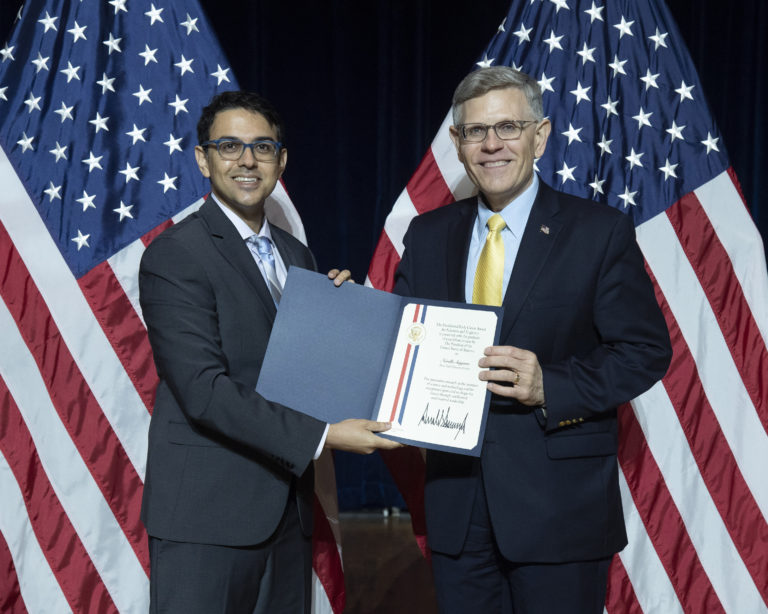NYU’s Neville Sanjana, an assistant professor in the Department of Biology and at NYU School of Medicine, has been awarded a Presidential Early Career Award for Scientists and Engineers.

New York University’s Neville Sanjana, an assistant professor in the Department of Biology and at NYU School of Medicine, has been awarded a Presidential Early Career Award for Scientists and Engineers (PECASE). The awards, announced by the White House, identify outstanding scientists and engineers who will broadly advance science and the missions important to federal agencies.
The PECASE Awards are the highest honor bestowed by the U.S. government on outstanding scientists and engineers beginning their careers and “who show exceptional promise for leadership in science and technology,” the White House stated in naming this year’s winners.
They are conferred annually at the White House following recommendations from participating federal agencies. Sanjana, a core faculty member at the New York Genome Center who is developing new tools for precise gene repair using CRISPR, a pioneering gene-editing technology, was nominated by the Department of Health and Human Services.
Recently, Sanjana and colleagues at the National Cancer Institute uncovered dozens of novel genes involved in resistance to therapies that harness the immune system to fight cancer.
The findings, which appeared in the journal Nature, stemmed from the team’s development of an innovative use of CRISPR—a “two-cell type” CRISPR assay system that specifically examines how genetic mutations in one cell can affect the interaction between two different cell types.
Under a Defense Advanced Research Projects Agency (DARPA) award, given in 2018, Sanjana is now working to accelerate the creation of new methods for precision gene editing to repair disease-causing mutations.
In addition, under a National Institutes of Health (NIH) “New Innovator” Award, a five-year, $2.9 million grant, Sanjana and his team are in the process of identifying the sequences and proteins that govern gene expression.
In the long-term, Sanjana seeks to construct a catalog of all functional elements in the noncoding genome—the part of the genome that does not provide instructions for making proteins but which is increasingly seen as vital in understanding how cells function—in order to more fully comprehend the nature of diseases such as cancer.
Further Update on July 31, 2019
Neville Sanjana, PhD, has been named a recipient of the prestigious Presidential Early Career Award for Scientists and Engineers (PECASE). Dr. Sanjana is a Core Faculty Member at the New York Genome Center (NYGC) and holds a joint appointment as Assistant Professor in the Department of Biology at NYU and Assistant Professor of Neuroscience and Physiology at the NYU School of Medicine. PECASE is the highest honor bestowed by the United States Government to outstanding scientists and engineers who are beginning their independent research careers and who show exceptional promise for leadership in science and technology. Dr. Sanjana earned this award in recognition of his pioneering work in functional genomics and in the development of new genomic tools for precision gene editing, using CRISPR to repair disease-causing mutations.

The Sanjana Lab develops new technologies and tools to understand how human genetic variants cause diseases of the nervous system and cancer. Dr. Sanjana and his research team use a multidisciplinary approach, combining genome engineering, pooled genetic screens, molecular genomics, bioinformatics, electrophysiology, and imaging, to dissect the inner workings of the human genome and its dysfunction in diseases like cancer and autism. Comprised of molecular engineers, biologists, neuroscientists, computer scientists, and bioscience entrepreneurs, the Sanjana Lab has as its aim is to create new technologies for genomics and advancing human health. Dr. Sanjana and his team work at the interface of bioengineering, neuroscience, and cancer.
In 2017, Dr. Sanjana was awarded the coveted NIH “New Innovator” Award. The grant supports his lab’s work in interrogation of the noncoding regions of the genome which is the 98 percent of the human genome that does not code for proteins. Utilizing advanced genome engineering and high-throughput sequencing, the Sanjana Lab aims to identify the sequences and proteins that govern gene expression.
A recipient of the Kimmel Scholar Award and the DARPA Young Faculty Award, Dr. Sanjana was also named a Melanoma Research Alliance Young Investigator. Earlier this year, he was also named the Brain and Behavior Foundation’s Leichtung Family Investigator. “I am very grateful for this recognition of our lab’s research from the Office of Science Technology and Policy,” Dr. Sanjana said. “This work would not be possible without federal funding support and the wonderful, talented scientists in the lab.”
